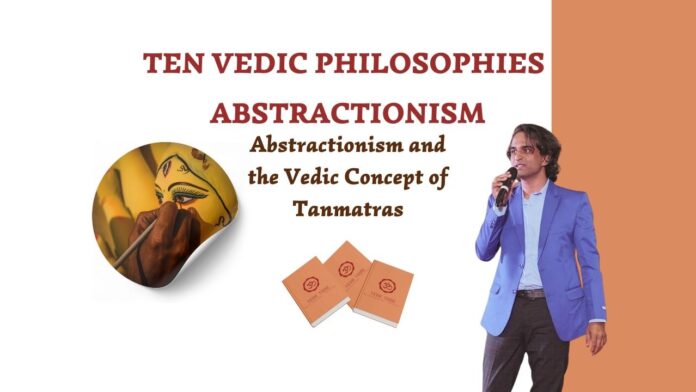Do abstract concepts really exist?
In the previous article, we discussed “absolutism” and in this article we will discuss the philosophical idea “abstractionism”.
Abstractionism is the philosophical view that abstract concepts, such as beauty, truth, and justice, have an intendent existence, i.e., independent of human perception. While these concepts may not be tangible or physical, they are nonetheless real and can be understood through reason and intuition.
Plato’s theory of Forms, which posits the existence of abstract, perfect entities that serve as models for the concrete objects we perceive, has influenced subsequent discussions of abstraction.
The Vedic Concept of Tanmatras
The Vedic tradition, particularly the Samkhya school of philosophy, offers a similar perspective on the nature of reality. According to Samkhya, the universe is composed of 24 fundamental principles, five of which are known as tanmatras. These tanmatras are subtle, abstract entities that correspond to the five sensory experiences:
Rupa (Form/Sight): The subtle essence associated with the sense of sight. It’s the underlying principle of color, shape, and form, giving rise to the visual world we perceive. As an abstract entity every experience arising out of “Rupa” exists. For example, the abstract entity “beauty” does exist and ultimately draws its essence from the beauty of almighty. Similarly, endless forms of material world exist; but they are put to action only as per the will of almighty.
Gandha (Smell): The subtle essence responsible for the sense of smell. It’s the fundamental principle of odor and fragrance, enabling us to experience different aromas. Hence, abstract entities like fragrance do exist independent of our experiences. In Vedanta, in endless such abstract entities resides – Parabrahman. This is indicated in Bhagavad Gita (7.9) in which Lord Krishna says “I am the pure fragrance of the Earth, and the brilliance in fire.” I.e., Parabrahman is immanent in all abstract entities.
Rasa (Taste): The subtle essence associated with the sense of taste. It’s the underlying principle of flavor, allowing us to experience sweet, sour, salty, bitter, and other tastes. Lord Krishna in Bhagavad Gita (7.8) says “I am the taste in water” indicating that Parabrahman is the underlying essence of all abstract entities.
Sparsha (Touch): The subtle essence responsible for the sense of touch. It’s the fundamental principle of texture, hardness, softness, and other tactile qualities.
Sabda (Sound): The subtle essence associated with the sense of hearing. It’s the underlying principle of sound waves, enabling us to perceive different pitches, volumes, and timbres. Lord Krishna in Bhagavad Gita (7.8) says “I am the sound of sounds in all living and non living beings”
These tanmatras are considered to be the building blocks of the material world. They absolutely exist independently of any particular observer and are the source of all sensory experiences.
This perspective is accepted by all Vedic schools of thought except Advaita Vedanta, wherein they are considered illusory.
Talavakara Upanishad:
The Upanishad starts with profound question into the nature of our experience of these abstract entities. Since it starts with an interrogative word “kena” (by whom), the Upanishad is also called “kena Upanishad.
In the first shloka it asks “What god set eye and ear to their workings?”.
For which it answers “ That which is hearing of our hearing… sight of our sight.. (is the ultimate Parabrahman, knowing whom) The wise are released beyond and they pass from this world and become immortal.”
The Significance of Abstractionism in Spiritual Practice
Starting point: The starting point of spiritual exploration is to enquire into our experience of empirical knowledge. I.e., we must begin by critically examining the nature of our knowledge gained through our senses. Awareness of Tanmatra and examining them leads us to the ultimate essence of all such abstract entities – i.e, Parabrahman.
Transcendence: Understanding the concept of tanmatras deepens our spiritual practice. By recognizing the underlying reality of these abstract principles, we can transcend the limitations of our physical senses and connect with the deeper levels of consciousness.
Devotion: Moreover, by contemplating the nature of reality, we can cultivate a sense of wonder and awe. We can appreciate the beauty and complexity of the universe, and recognize the divine presence in all things. This is the starting point of devotion which is the key to liberation.
The Vedic Tribe is happy to have introduced these ten philosophical thoughts in Vedic tradition.
Our intention is to create enough curiosity in you to enable you to study scriptures in Vedic tradition and adopt its teachings in your day-to-day life.
All the best.
Madhwesh K
Vedic Tribe

